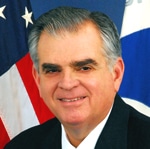WASHINGTON — By unanimous voice vote, former Rep. Ray LaHood (R-Ill.) was confirmed by the Senate Jan. 22 as President Obama’s transportation secretary. A day earlier, the Senate Commerce Committee enthusiastically recommended the confirmation.
LaHood becomes the 16th transportation secretary since DOT was created by Congress in 1967. A listing of his predecessors is found, below.
Over the next week, LaHood is expected to meet with prospective modal agency heads and make his recommendations for nomination to the Obama transition team.
Among DOT agencies of special interest to UTU members for which chiefs are to be nominated are the Federal Railroad Administration, the Federal Motor Carrier Safety Administration, the Federal Transit Administration and the Federal Aviation Administration. A nomination to the three-member Surface Transportation Board also is expected.
LaHood now heads the 60,000-employee DOT and its various modal agencies that regulate transportation safety, administer Amtrak and highway funding, and regulate railroad mergers, abandonments and freight rates paid by captive shippers.
At his confirmation hearing, LaHood expressed strong support for Amtrak and increased funding for the national intercity rail passenger network. He said he also would focus on public-private partnerships to increase funding sources for projects bringing roads, bridges and other forms of infrastructure to “a state of good repair.”
Additionally, LaHood expressed support for new infrastructure spending to improve freight transportation by rail, and he supported and increased spending on commuter transit programs.
LaHood said his position as a Republican member of a Democratic president’s cabinet will enable him to find consensus on a variety of issues affecting transportation policy.
Senate Commerce Committee Chairman Jay Rockefeller (D-W.Va.), told LaHood that “after years of neglect, Congress finally passed a long-term Amtrak authorization last fall that provides strong support for our national railroad. As secretary, I will be looking to you and the department to fully and quickly implement this bill and to further pursue the development of high-speed rail corridors in areas where such service can help alleviate highway and aviation congestion.
“On the freight rail side,” said Rockefeller, “I’m hoping you’ll help us develop ways to improve competition and service in the railroad industry while ensuring that the railroads are able to adequately invest in their infrastructure to meet growing demand.”
Without being specific, LaHood said that if he is confirmed as DOT secretary, safety would remain the “central focus” of DOT.
LaHood, 63, was chief of staff for former House Minority Leader Robert Michel (R-Ill.) for 10 years before Michel retired and LaHood replaced him in Congress. LaHood took office in 1995 as Republicans gained control of the House for the first time in 40 years, and relations between the GOP and congressional Democrats were at a low ebb.
At his confirmation hearing, LaHood was praised by his Illinois colleague, Democratic Sen. Dick Durbin, who introduced him at the hearing, for efforts to improve relations between Democrats and Republicans.
Earlier this week, the Senate confirmed former Arizona Gov. Janet Napolitano as homeland security secretary.
The nomination of former Rep. Hilda Solis (D-Calif.), to be labor secretary, remains stalled in the Senate owing to Republican opposition to her congressional support for the Employee Free Choice Act.
The AFL-CIO called Solis a longtime friend of the labor movement. It observed that while in Congress, she not only voted for the Employee Free Choice Act, but also voted to raise the minimum wage, protect the wages of construction workers, strengthen fair and equal pay laws for women, and to impose tough workplace safety standards.
Previous transportation secretaries:
Alan Boyd, January 1967 – January 1969
John Volpe, January 1969 – February 1973
Claude Brinegar, February 1973 – February 1975
William Coleman, March 1975 – January 1977
Brock Adams, January 1977 – July 1979
Neil Goldschmidt, August 1979 – January 1981
Drew Lewis, January 1981- February 1983
Elizabeth Dole, February 1983 – September 1987
Jim Burnley, December 1987 – January 1989
Sam Skinner, February 1989 – December 1991
Andrew Card, February 1992 -January 1993
Federico Pena, January 1993 – February 1997
Rodney Slater, February 1997 – January 2001
Norman Mineta, January 2001- July 2006
Mary Peters, October 2006 – January 2009

